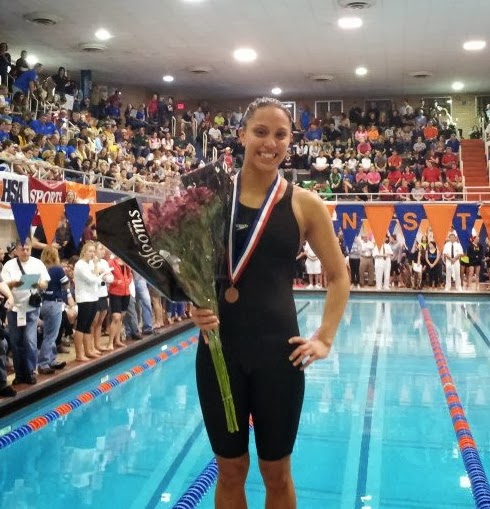“It
was a big aspect in my life without even knowing it,” said Ceja.
Ceja
also serves as the head coach of the swimming and diving teams and women’s water polo at
Northside. He is also the co-founder and head coach of the Northside Aquatics Club.
After
graduating high school, Ceja joined the U.S. Navy. Ceja called himself a
glorified lifeguard who worked as a rescue swimmer and swim instructor during
his time in the Navy.
“I
still had to help people learn how to swim and try to help people become better
swimmers,” Ceja said.
After
eight years in the Navy, Ceja said he decided to leave because he didn’t agree
with the politics.
“I’m
not a big fan of politics, but you have to deal with it,” Ceja said.
After
leaving the Navy, Ceja started attending the University of Illinois at Chicago
in 2000. While studying at UIC, Ceja became the assistant coach at Northside
College Prep.
“My
old swim coach in high school was the first swimming coach here, so when he
found out I was getting out of the Navy, he asked me to help him out,” Ceja
said.
In
2003, Ceja was called back into the Navy and had to leave his studies and
coaching job. Ceja graduated from UIC in December 2007 with a Bachelor’s degree
in kinesiology with a concentration in movement science.
Ceja
uses his background in kinesiology to improve his swimmer’s technique, as well
as preventing and treating injuries.
“For
a long time here at Northside we didn’t have an athletic trainer. We just
started getting one maybe four or five years ago and they’re only here maybe
two or three times a week. So whenever someone got hurt I had to do something
to help them out,” Ceja said.
Assigning
good stretches before swim practice, having an easy warm-up that swimmer’s can
ease into and teaching proper technique are all ways to help prevent injuries,
Ceja said.
Ceja
was born and raised in Chicago by parents from Michoacán, Mexico. He is the
youngest of six siblings, and he is the only one in his family that became a
dedicated swimmer. He spent his summers in the pool at River Park. Ceja worked
for the Chicago Park District as a lifeguard at River Park for three years and
57th Street Beach for five summers.
When Ceja began coaching at Northside College Prep, he was surprised by the parental support the team received compared to the lack of support apparent during his high school years on the swim team.
“It’s
completely different. I’d say the majority of my teammates were Latino. There
was rarely ever a time there were parents in the stands. There were always
friends, girlfriends and other students. I never really saw the parent support
there. A lot of it is because the parents are working,” Ceja said.
Latino
parents focused on working to support the family and keeping their kids off the
streets, said Ceja. According to Ceja, parental support for Latino teams has
grown.
“Curie
High School is a big Latino swim team. It’s small, but their majority is
Latino. I see their parents coming into the meets, even here at Northside. The
kids that swim at the Chicago Park District, their parents are showing up to
those meets. And it’s great,” Ceja said.
Ceja
founded the Northside Aquatics Club to provide a stable practice facility for
swimmers. He said promoting the sport and keeping kids interested in swimming
during the year is one of his challenges.
“You
need kids that are dedicated to the sport in order to become successful at it,”
Ceja said.























